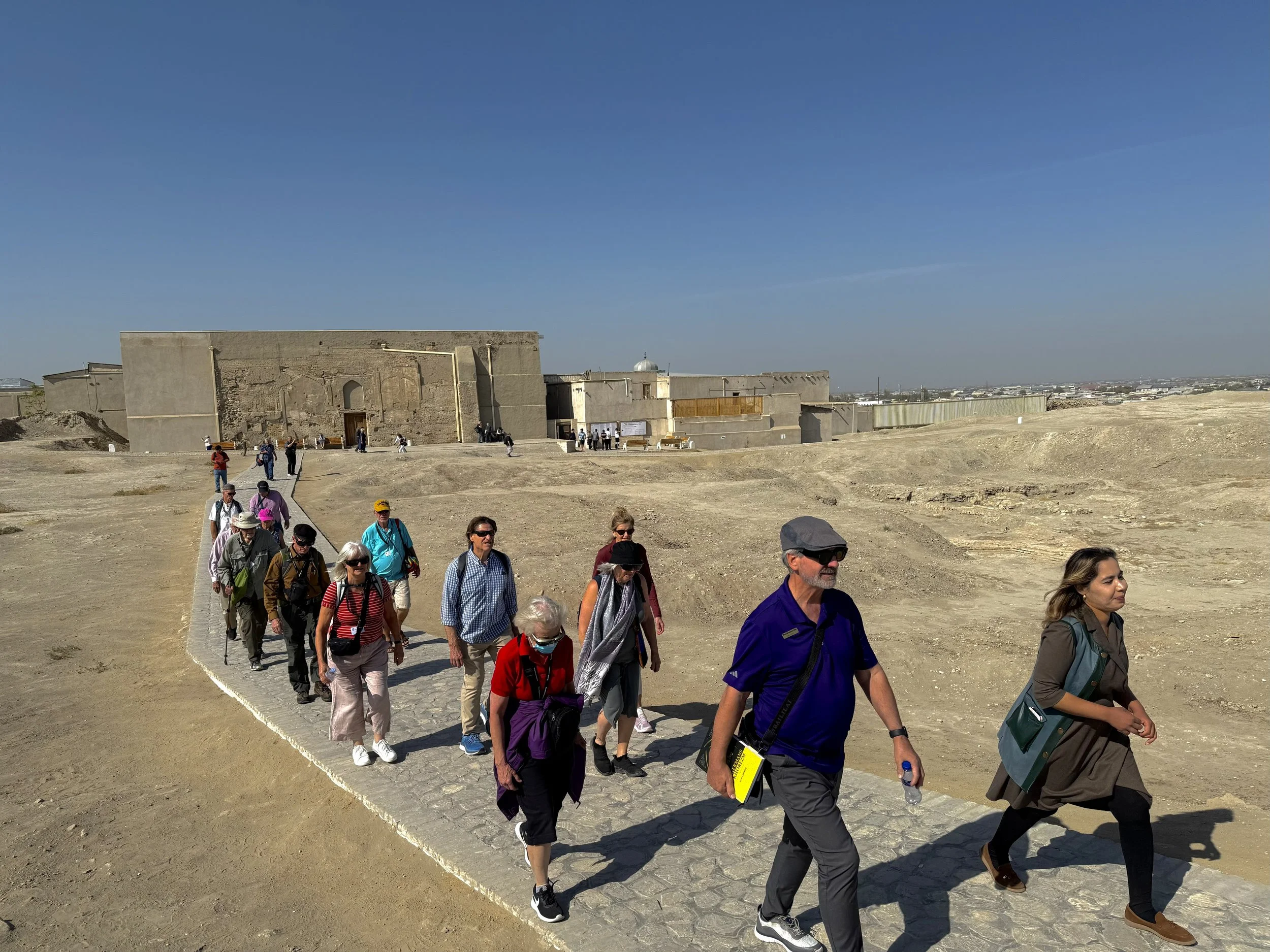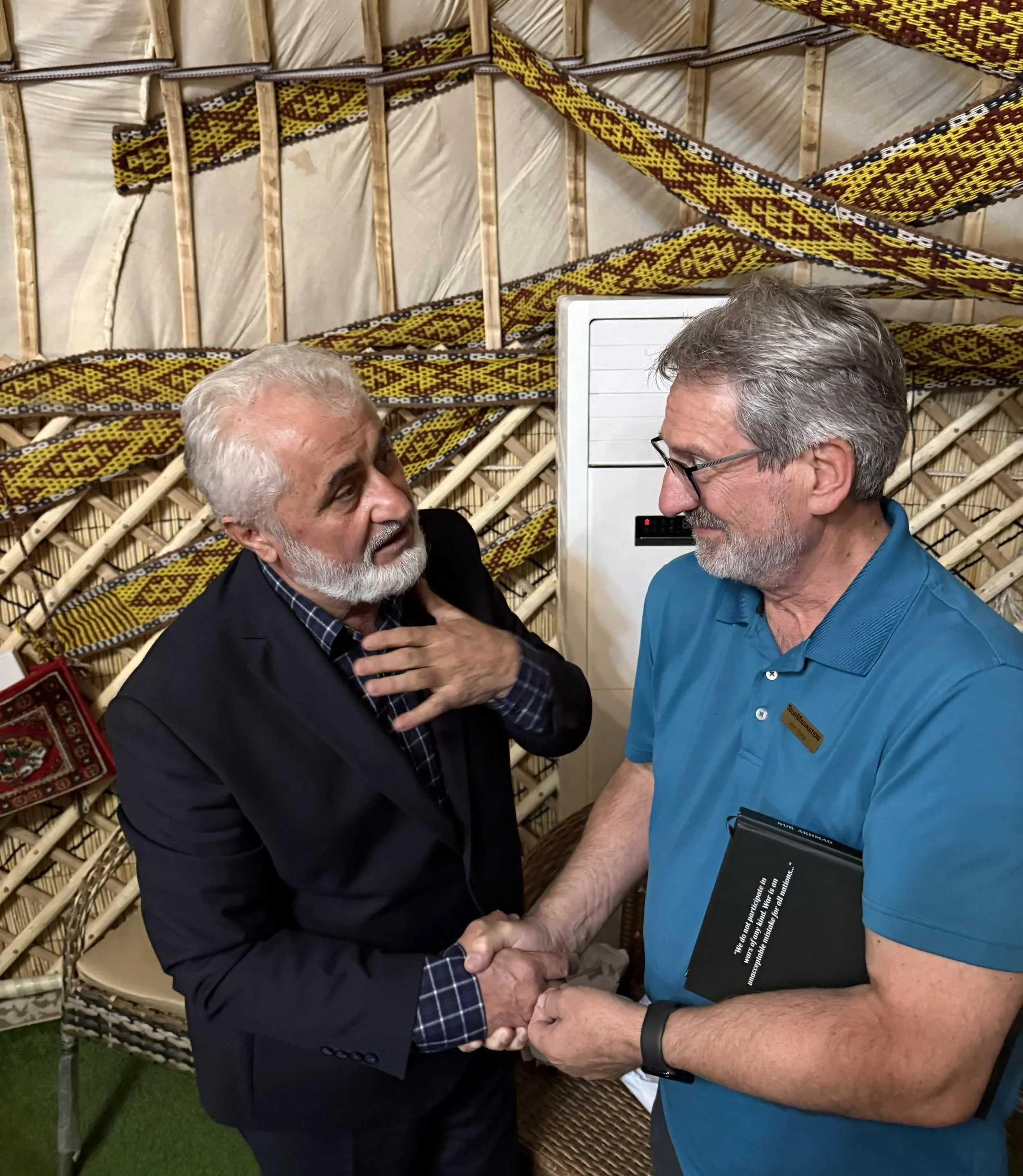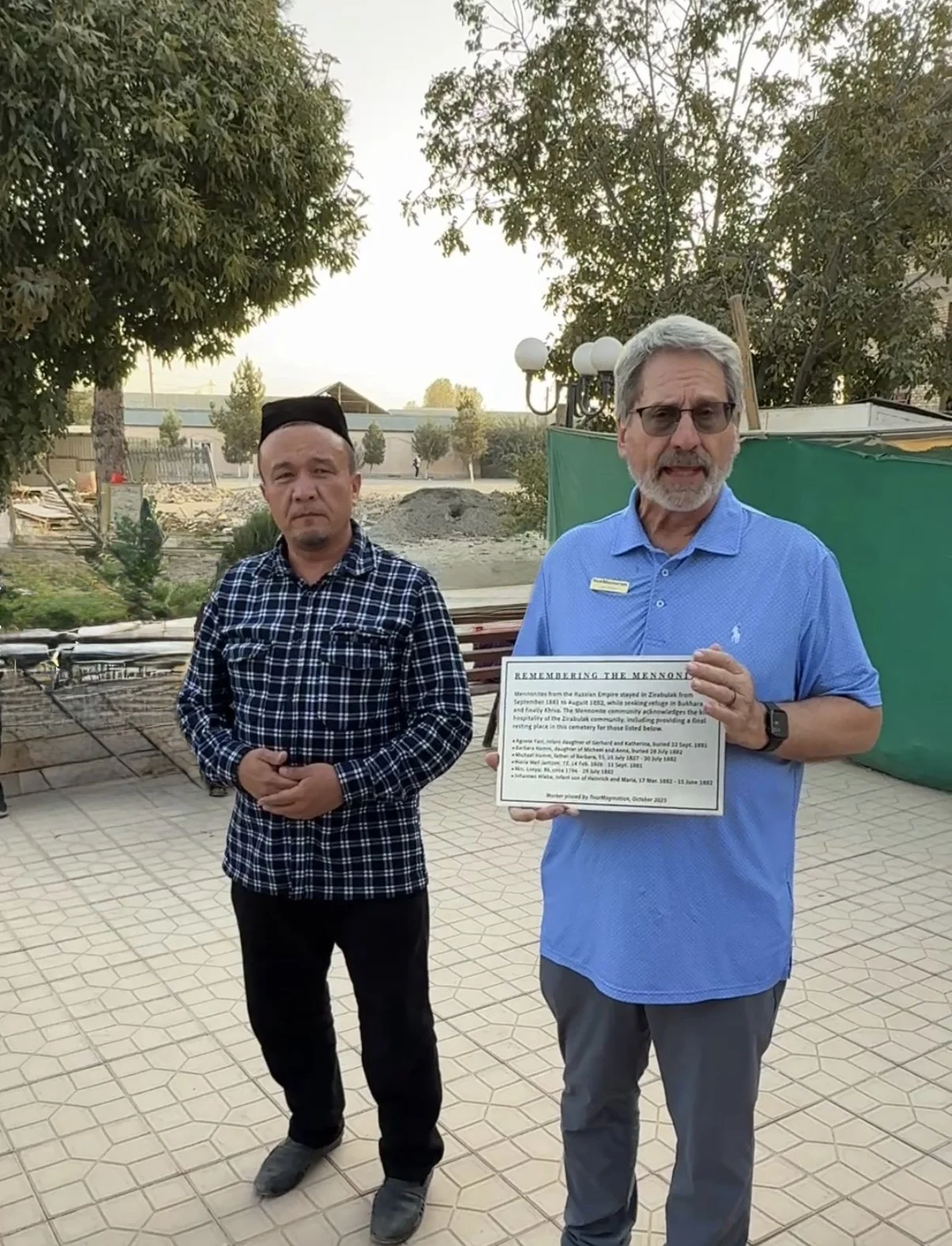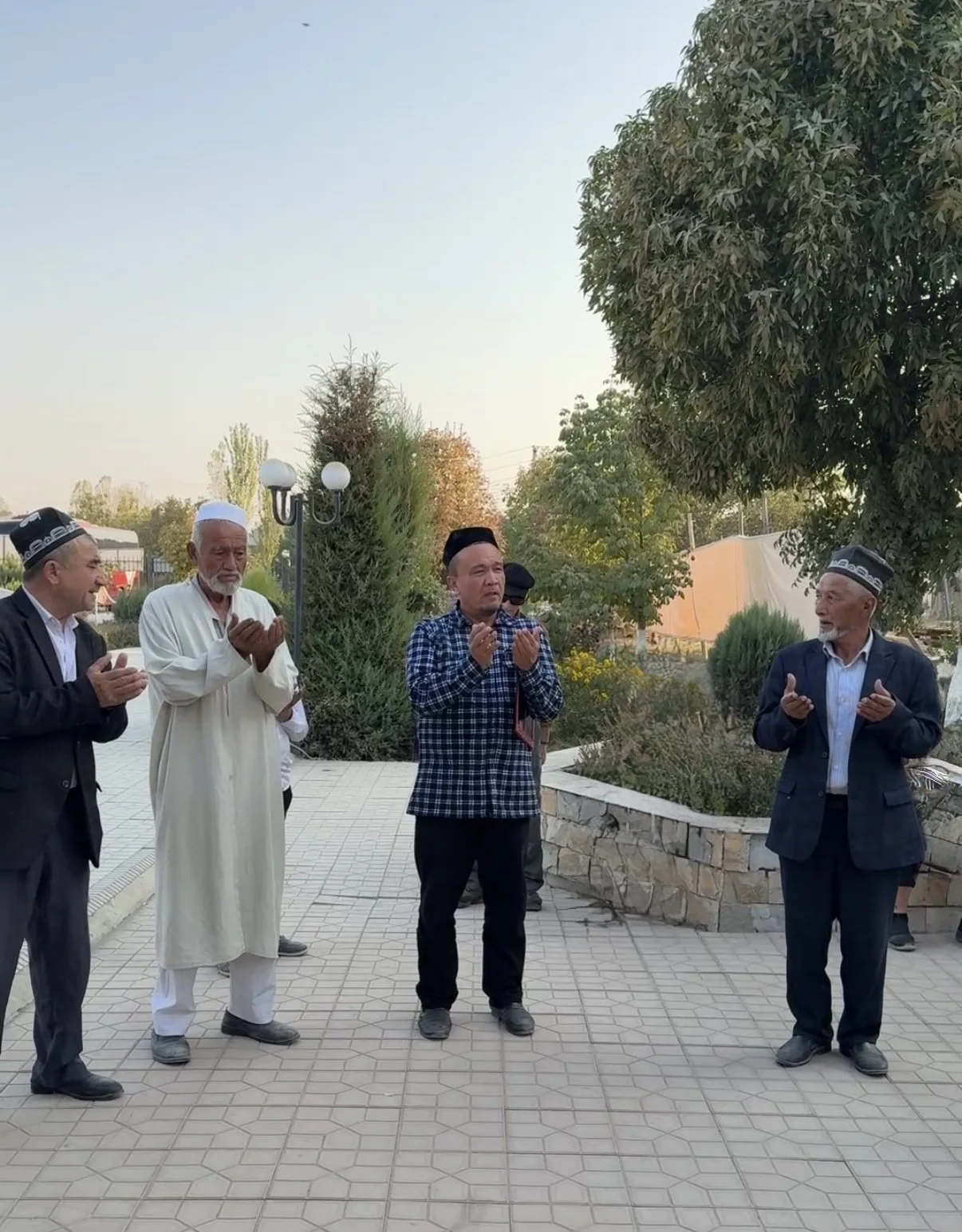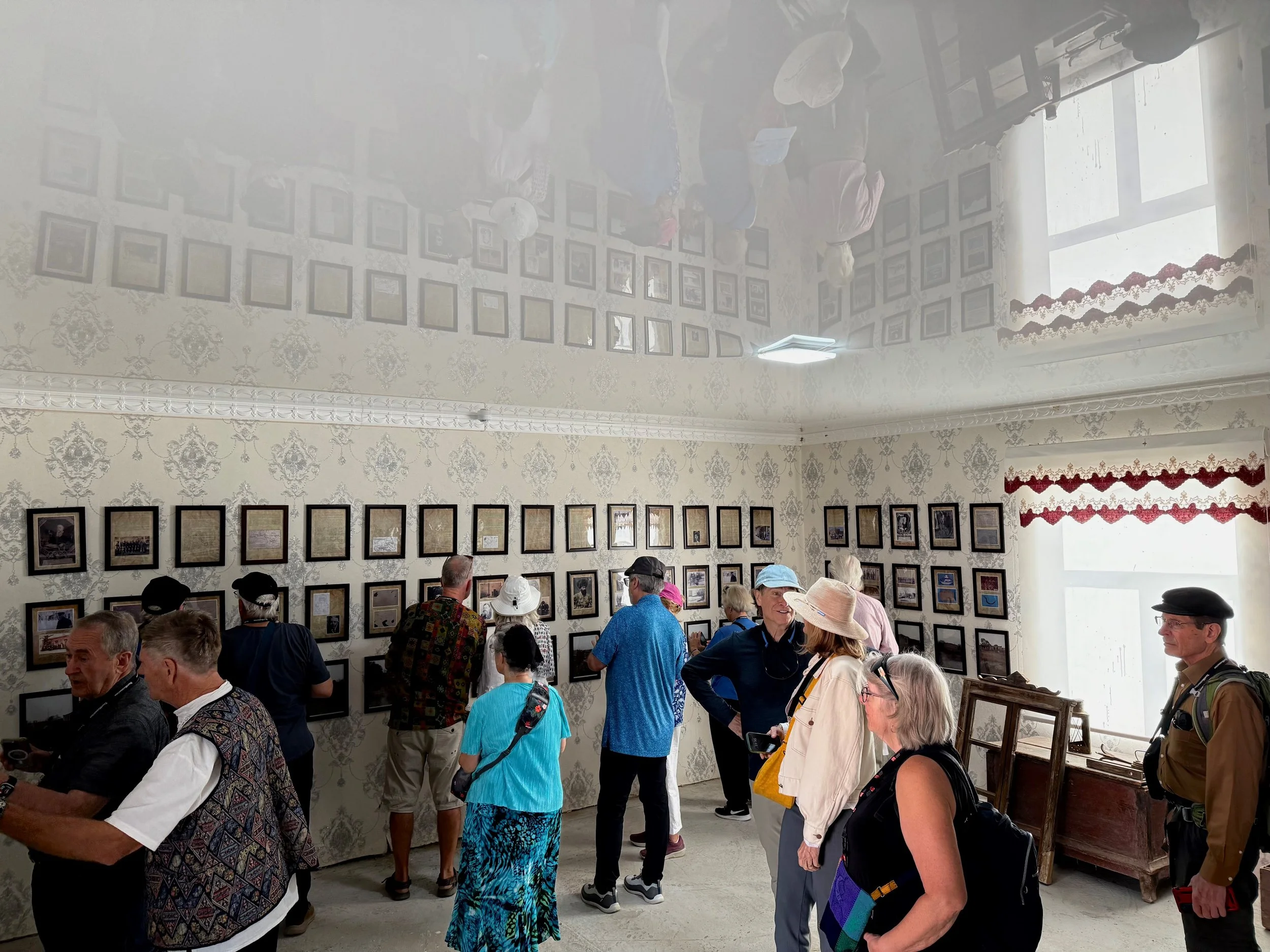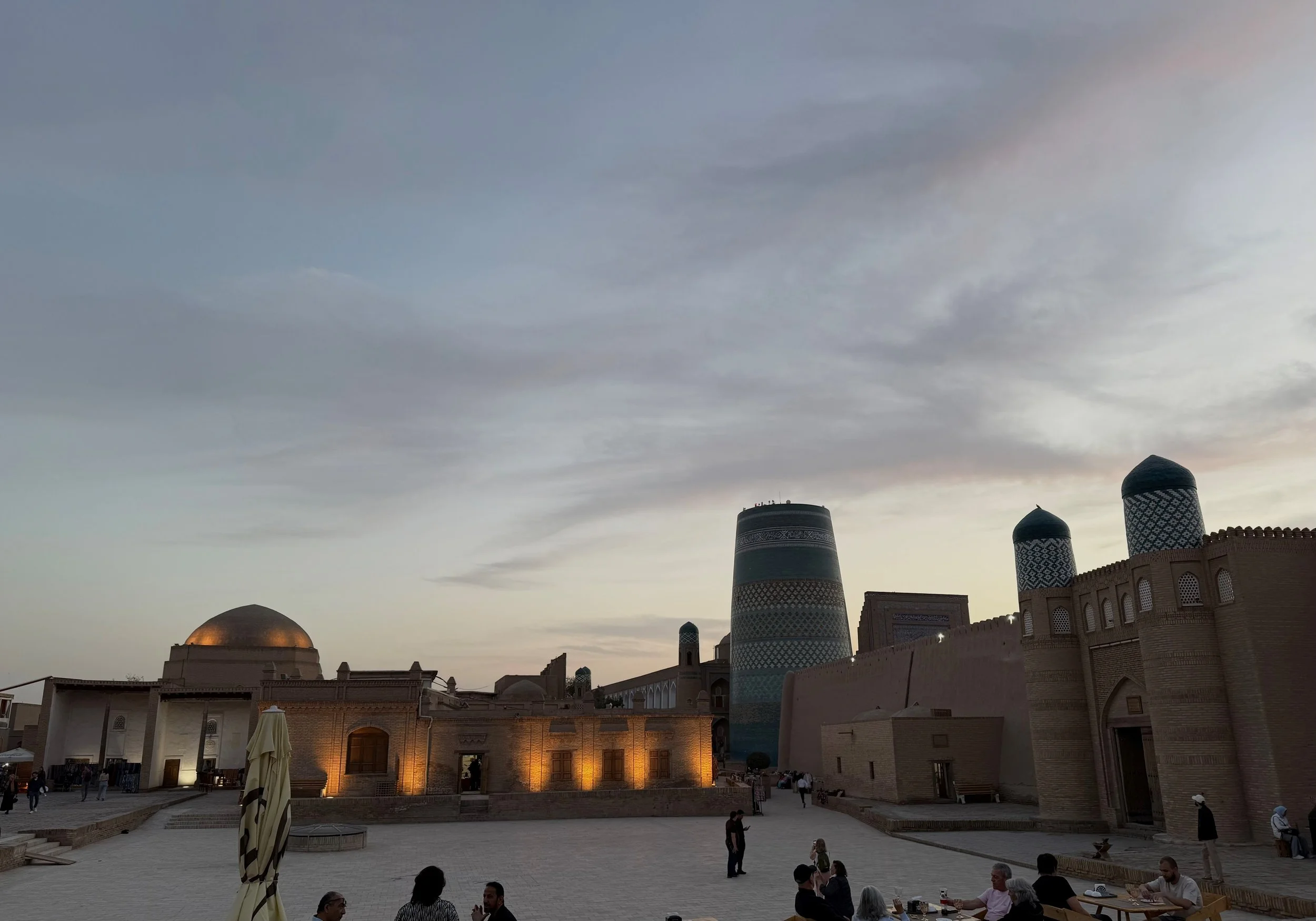Another Chapter On The Silk Road
Itchan Kala at Dusk - Khiva, Uzbekistan
Returning to a Familiar Story
Historian, John Sharp leading a TourMagination group
When our group set out along the Silk Road this autumn, we thought we were returning to a familiar story — one that TourMagination travelers, led by historian John Sharp, have traced for nearly two decades. We came to remember the Mennonite communities who journeyed across Central Asia in search of freedom and faith, eventually settling in Ak Metchet near Khiva, where they lived peacefully with their neighbors for 51 years. But this time, something had changed. We discovered that the story is being told again — not by Western pilgrims retracing the trek, but by Uzbek friends who have taken up the mantle of remembrance.
Orientalist & Historian Latofat Abdrimova presenting photographs and books (with interpreter Nilufar Abdusatarova and John Sharp)
A Tashkent Surprise
In Tashkent, we were introduced to Latofat Abdrimova, an Uzbek Orientalist and historian who has helped uncover a chapter of Mennonite history not widely known until recently. Her grandfathers served as personal assistants to the Khans of Khiva, a connection that has given her privileged access to government archives and historical materials rarely seen by the public. Among these are a remarkable collection of photographs — images that are more than historical records. They are bridges between worlds, tangible proof that the Mennonite story is now being cared for by new hands.
Author & Journalist Nur Akhmad and John Sharp.
We also met Nur Akhmad, author and journalist, who presented freshly printed copies of the English translation of his book The Germans of Khorezm. Nur spent his early childhood near the village of Ak Metchet, where he first heard stories of the German Mennonites who once lived peacefully as neighbors before being forcibly evicted under Soviet rule. The book’s introduction describes it as a fitting tribute to the 500-year anniversary of the Anabaptist-Mennonite movement, and our group was invited to attend a formal unveiling and presentation of the book the following week in the capital of Khorezm, Urgench.
Friendship Across Generations
Friendship itself has become a heritage – partnership continuing across future generations
Our time near Zirabulak reminded us that friendship itself can become a heritage. Though not a new chapter in the literal sense, it continues to inspire. Standing among local partners who have long welcomed Mennonite travelers, Sonnet Bobba spoke of the desire to pass this relationship to the next generation in his family — so that we can continue to meet, to share, and to keep telling the story. It was a simple but profound vision: that remembrance is not complete when the tours end, but when friendship endures.
A Shared Prayer in Zirabulak
At the Kyk Ota Mosque near Zirabulak, John Sharp presents to local imam a new memorial marker that honors Mennonites buried more than a century
This year, that spirit of remembrance found a meaningful expression in Zirabulak, where our group placed a memorial marker — donated by previous travelers, Ken and Karen Sensenig — at the Kyk Ota Mosque to honor the Mennonites buried there more than a century ago. The local imam met us with warmth and dignity.
The imam and local leaders offering a prayer
As we stood together — Mennonites and Muslims, travelers of various backgrounds — he offered a prayer for those laid to rest in that soil long ago and a blessing on our journey. It was a quiet and respectful moment that reflected the mutual goodwill and shared humanity we experienced throughout our time in Uzbekistan.
Preserving and Sharing the Story
Efforts being made at former Mennonite settlement in Ak Metchet to tell the story
In both Khiva and Ak Metchet, we witnessed early efforts to develop tourism that honors this shared past. Local magazines now feature the legendary photographer Khudaybergen Divanov, who was inspired by Mennonite photographer Wilhelm Penner. Other leaders are working to interpret Mennonite history for visitors — not as outsiders studying a foreign heritage, but as collaborators preserving a story of peace, resilience, and hospitality. These initiatives may seem modest, but they carry deep meaning. When people across cultures work together to remember truthfully, the result is not nostalgia but a deeper understanding that can help future generations live together in peace. The story of the Mennonites in Central Asia is becoming a story of shared stewardship.
Group photo at the Urgench book launch with special dignitaries, media, TourMagination travelers and Uzbek Mennonite descendant
Descendants Return & A Living Legacy
Among our group were two travelers whose ancestors had lived and journeyed the Silk Road. For them, this pilgrimage was far more than a historical visit — it was a homecoming of spirit. To walk the same ground their forebears once walked, and to see that story now honored by Uzbek scholars and students, was profoundly moving.
At the Urgench book launch — a public event attended by dozens of special guests, academics, students, and media — these descendants were invited to speak. Their heartfelt words of gratitude and reflection, shared alongside those of our Uzbek hosts, added a new dimension that had not been part of this journey in over twenty years of tours. Through them, history gained a living voice. Nur’s ambitious vision is that this book might help spur peace among faiths — perhaps, he hopes, even inspiring a future Nobel Peace Prize.
Perhaps the most poignant surprise came when Nur introduced us to a descendant of the Mennonite settlers who had remained in Uzbekistan. This Russian-speaking man had grown up unaware of his Mennonite roots, his family’s faith story nearly forgotten. As we stood together, listening to his journey, the centuries between us seemed to disappear. It was as if the Mennonite story had come full circle — not preserved in museums, but carried quietly in hearts and rediscovered through friendship. Efforts are now underway to help him reconnect with his family history.
Sunset views near the Mennonite Museum in Khiva
The Next Chapter
The Silk Road story is not finished. It continues in the hands of Uzbeks who are translating, preserving, and sharing; in the descendants who are learning who they are; and in travelers who come, not to take, but to listen. This renewed dialogue offers a reminder of what is possible when mutual respect and peaceful living take root across cultures and faith traditions. “Another chapter on the Silk Road,” indeed — one written in friendship, bound by gratitude, and still unfolding.


